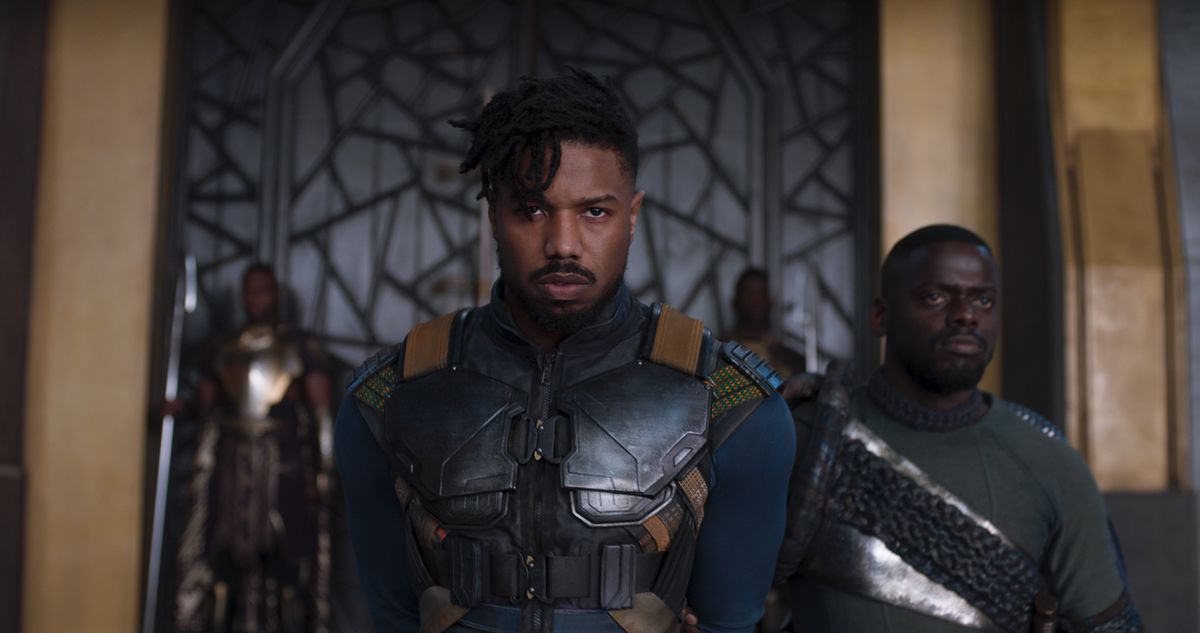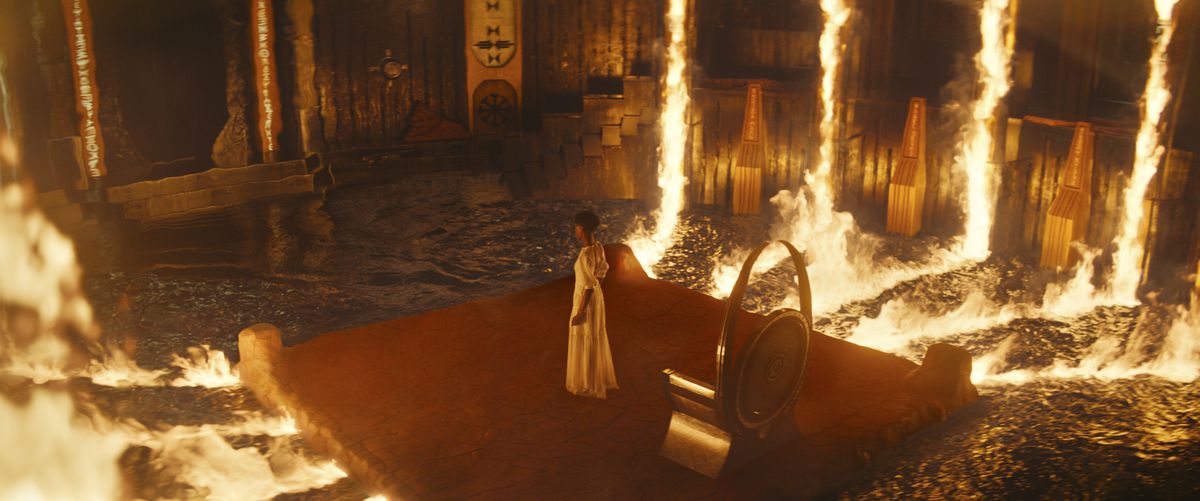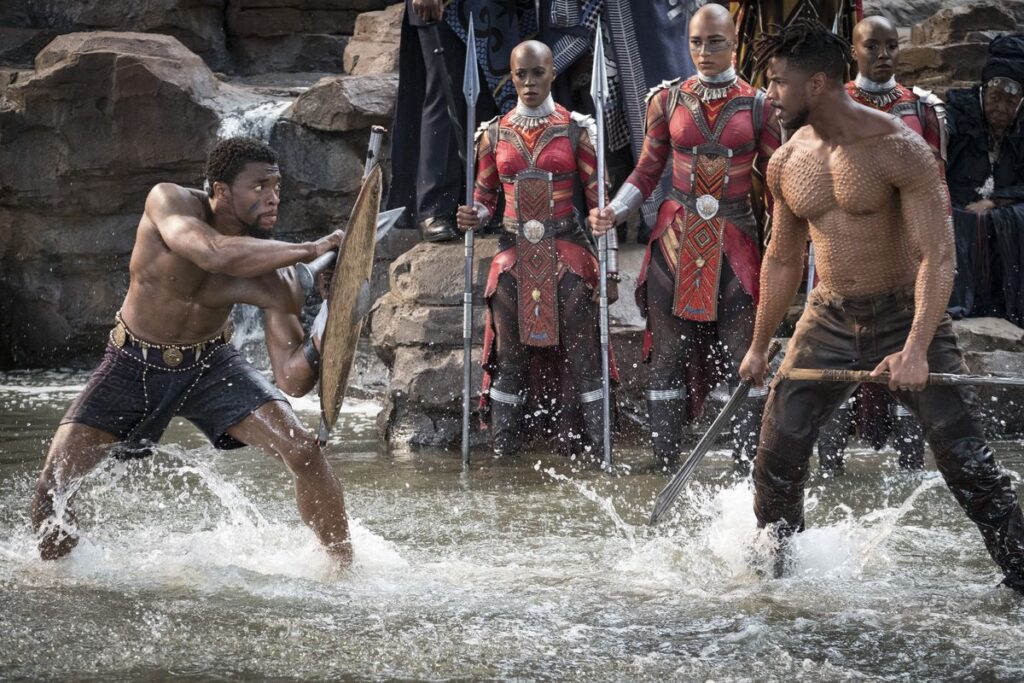Back in 2018, Ryan Coogler’s Black Panther set off a wave of memes that have haunted the Marvel Cinematic Universe ever since, all because the primary antagonist, Erik Killmonger (played by Michael B. Jordan) didn’t follow what had become the standard MCU model for a villain. “Killmonger was right” stuck in part because it’s a catchy phrase (and endlessly transferrable to “Thanos was right,” “Riddler was right,” and so forth).
But it became such a pervasive argument hanging over the film for a different reason: because it’s true. After a series of lackluster MCU villains whose primary motivations were “power for power’s sake” or “I just hate this movie’s hero,” Killmonger came along with a particularly understandable grudge against his homeland of Wakanda, and an agenda that went beyond personal retribution and extended to helping oppressed Black people around the world by using Wakanda’s military power on their behalf. Audiences responded to that agenda, often with resentment that the movie’s hero, King T’Challa, aka Black Panther, didn’t ever fully give Erik’s grievances their due.
In the powerful sequel, Black Panther: Wakanda Forever, Killmonger’s tactics get a new airing, and a new chance to be right, in a few different ways. But his legacy is wronged at the same time. The movie respects the ways fans responded to the character the first time out and takes advantage of it at the same time. But Coogler and co-writer Joe Robert Cole could have gone further in giving Erik the hearing he missed the first time around.
[Ed. note: Spoilers ahead for one key scene in Black Panther: Wakanda Forever.]
Is Killmonger in Wakanda Forever?
Photo: Marvel Studios/Disney
Some fans have hoped all along that Black Panther sequels might somehow find a way to resurrect Killmonger, and even turn him into the new Black Panther. (It seemed improbable, but in a franchise increasingly leaning into the infinite possibilities of the multiverse, it wasn’t impossible — episode 6 of the MCU animated series What If…? did exactly that.) Early rumors that Jordan was returning in the role only fueled the fire.
As it happens, Jordan does return as Killmonger — but only posthumously. When Wakandan scientist Shuri (Letitia Wright) finds a way to synthesize the heart-shaped herb that bestows the powers of her country’s signature hero, Black Panther, on those who consume it, she follows the path her brother T’Challa (Chadwick Boseman) took in Black Panther, and consumes the herb in a ritual process. It sends her on a vision to the Ancestral Plane, where T’Challa and Killmonger alike were previously able to meet and speak with their dead fathers.
But instead of her father, her brother, or her recently deceased mother Ramonda (Angela Bassett), Shuri finds Erik Killmonger waiting for her, and smugly announcing that she called for him rather than any of the others. She denies it, but it quickly becomes clear that he’s telling the truth. Grief-stricken over her brother’s death due to an unnamed disease, and furious over her mother’s death at the hands of seemingly immortal mutant Namor (Tenoch Huerta), Shuri doesn’t want wisdom, or a solace she doesn’t believe in. She wants revenge. So she instinctively reaches out for the most powerful revenge-driven figure she’d ever met.
Killmonger was right

Image: Marvel Studios/Disney
The scene is a thrill for fans of the character. Mostly, the chance to see Jordan in action again feels like a strong counter to the way he disappears in the third act of Black Panther, turning into an unsatisfying CG effect instead of a compelling person. In Wakanda Forever, he gets to return to the purring, confident villain he plays in the early parts of Black Panther, and he gets to dominate a room with his presence. He also gets to lay down some truth bombs, vocalizing the things Shuri knows but won’t acknowledge: that her brother and father weren’t cruel or ruthless enough to offer her the advantage she wants in the upcoming fight against Namor.
Much of Wakanda Forever is a battle for Shuri’s soul: It’s about the way she navigates her grief over T’Challa and then her mother, and the way she navigates the temptation Namor offers her, to turn Wakanda’s security problems into a grudge against the entire jealous, covetous world. The major question stretching throughout the film is what she’ll choose: The dream of open borders and outreach that T’Challa promised the world? Isolation in her lab, and the experiments she loves? The companionship and work partnership represented by her new acquaintance Riri (Dominique Thorne), possibly the first person she’s ever met who could match her intellect, curiosity, and talent? Rulership of Wakanda at the expense of the rest of the world?
Not all of these choices are mutually exclusive, but they’re all on the table, and they all represent possible paths she could navigate, if she doesn’t let revenge consume her. But Killmonger, who did let revenge consume him, represents a barrier she has to get over if she’s going to move forward. He’s the thing all good villains have to be: a dark mirror of her obsessions, a reflection of exactly what she could be if she makes selfish and self-seeking choices.
But at the same time, he is right when he says she’s hurting and angry, and wants to do something about it. He’s right when he says that kindness, mercy, and prioritizing other people’s needs didn’t save her family members. And he’s right when he calls her out for denying what she’s feeling and what she wants. He may be dead and on the Ancestral Plane, but he’s just as incisive and decisive as ever.
Killmonger was wronged

Image: Marvel Studios/Disney
And yet the scene could have been so much more. Black Panther never really lets its Wakandan characters acknowledge the unfairness of T’Chaka abandoning Killmonger to grow up fatherless and alone in America. The audience feels the injustice and sees the depth of Erik’s feelings, but everyone else in the story is more concerned with their own agendas. Wakanda Forever has so much going on already there’s no point in rehashing that plot, or relitigating that point. But it’s worth noting how eloquent, emotional, and convincing Killmonger was in the first movie in saying his piece, and how comparatively little he gets to say in Wakanda Forever.
He makes the point that Shuri sought him out for advice on revenge and power, but he doesn’t offer any advice more specific or useful than “take care of business.” He doesn’t bring her the tactical advantages or insight that seem like they’d come naturally to him. He sneers at Shuri’s family but doesn’t offer an alternative to what he labels as their weaknesses, other than “Follow the path I followed, which failed and left me dead and labeled a villain.” So much opportunity is lost in the scene between him and Shuri, because he’s given so little to say beyond confirming what the audience already knows: that Shuri is angry, bereft, and looking for someone to confirm her anger as righteous and just.
Killmonger’s validation of Shuri’s anger is meaningful in the moment, and also horrifying in the best way. It’s a moment where a hero seeks out a villain to tell her it’s OK to perform villainous acts, to assure her that whatever she wants to do to her enemies is justified. And her exchange with Killmonger does help her: It confirms what she’s thinking and feeling, and what she’s been trying to deny. Inadvertently, he helps her make the right choices down the line by clearly defining what the wrong choices are, and why they’re so tempting — even if that isn’t remotely what he’s trying to do when he speaks to her.
But it’s such a short scene, wasted on denial and one-upmanship. Shuri never does air any of the most logical arguments for her to make. She doesn’t address how grief has pushed her to embrace the idea of talking to her ancestors, in spite of all her lack of faith in the supernatural. She doesn’t make the obvious point that the road he’s pushing her toward didn’t do him any good. Just a little more pushback from her would have enabled so much more from him — and it would have been worth it to hear why he still believes revenge is the way to go, even though it failed him, or how he might have gone about talking her down a road she was hesitant to accept.
And in the end, she seeks him out for advice, but all she gets is “Revenge is good.” Killmonger had plenty of strengths in the righteous aspects of his cause, and his full confidence in his actions. But he’s also a strategist and a planner, and he doesn’t evoke any of that, even in the simplest Art of War-style way, in terms of telling her to find and exploit her enemy’s weaknesses. His rhetoric and the force of his presence were major weapons too, and Wakanda Forever doesn’t give him nearly enough space to unleash them.
It’s a glorious scene anyway. It’s both a shock to the audience and a perfectly logical confirmation of things we already know. (It also opens up a lot more questions of who exactly gets to hang out on the Ancestral Plane, which clearly isn’t concerned with hero/villain dichotomies.) But the sequence still leaves a lot of potential on the table, given the chance to separate Killmonger from his origin story and let him shine. It’s a place where Coogler could have dug deeper into the themes of revenge and grief and vindication, and taken even more advantage of Jordan’s presence. Who knows how many more chances Killmonger will get to show up and be right — why not make more of this one?

